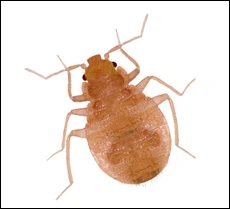
Editor’s note: A peer-reviewed study published Wednesday in a journal of the U.S. Centers for Disease Control and Prevention suggests that bed bugs could play a role in disease transmission. In a tiny sample of bed bugs, collected from patients living in crowded conditions in an impoverished neighborhood in Canada, researchers found the drug-resistant bacteria known as MRSA. In response to this study, National Pest Management Association released the following overview and speaking points that were prepared by Professional Pest Management Alliance.
Background:
On Wednesday, May 11, the Center for Disease Control and Prevention published the results of a peer-reviewed study that suggests bed bugs may be involved in disease transmission. The study, conducted in an impoverished community in Vancouver, British Columbia, tested a small sampling of bed bugs (5) collected from several patients (3) who were hospitalized for unstated causes. Hypothesizing the bugs were vectors for "the transmission of antimicrobial drug-resistant pathogens" researchers performed tests which found the bacteria Methicillin-resistant Staphylococcus aureus (MRSA) and Vancomycin-resistant Enterococcus faecium (VRE) present in the collected pests. Marc Romney, one of the study's authors, noted "even though this is a small study, it suggests that bed bugs may be playing a role in the transmission of MRSA in inner city populations where bed bug infestations are a problem."
Since the release of yesterday's report, as of last night, more than 450 news articles had been published about the study. We expect this study to reignite the bed bug fever within the national and local press.
The National Pest Management Association has reviewed the report and found that it leaves many questions unanswered. We do not plan to fuel this conversation and public fear by promoting news coverage of the survey. Comments from NPMA will cite the study as one of the many examples of why additional, scientific research on bed bugs must be conducted. We encourage members to refrain from comments suggesting that bed bugs may contribute to the spread of MRSA or other diseases.
Statement for Member Use:
Since the resurgence of bed bugs in the 1990s, the National Pest Management Association (NPMA) has been advocating for funding for research on bed bugs, including most recently at the EPA's Bed Bug Summit, the Congressional Bed Bug Forum and through direct visits with Members of Congress. With the dramatic resurgence of this pest and the lack of basic biological data available consistent with today's scientific standards and practices, it is imperative we better understand more about the biology and habits of the pest. According to a study conducted by NPMA, one in five Americans has now come into contact with bed bugs directly or indirectly through friends or family members. Scientific research on the pest will better equip pest management professionals to control bed bugs efficiently and effectively.
Talking Points
- Many pathogens have been found to be associated with bed bugs, however, no evidence has been uncovered (including the results found in this particular study) indicating that bed bugs can transmit disease to humans. This is why additional research continues to be a great priority.
- Only in recent years has research ramped up on this pest and there is still much work to be done regarding scientific research on the biology of bed bugs.
- More than 95% of pest professionals reported treating bed bugs last year; up from fewer than 25% of professionals in 2000.
- 76% of pest professionals believe bed bugs are the most challenging pest to control.
Latest from Pest Control Technology
- NPMA Shines ‘Spotlight’ on Rodenticides at Atlanta Event
- ActiveGuard Mattress Liners Offered to Philadelphia Fans Traveling to The Big Game
- Spider Hangouts
- Pest Index Increased 11 Percent YOY in December
- Hawx Pest Control Earns QualityPro Accreditation
- Envu Announces Lichtenstein as Chairman of Board of Directors
- Spider Management, Cockroach Identification, Use of AI Tools Hot Topics at Purdue Conference
- Rose Pest Solutions Promotes Kandler to District Manager of Columbus (OH) Office





